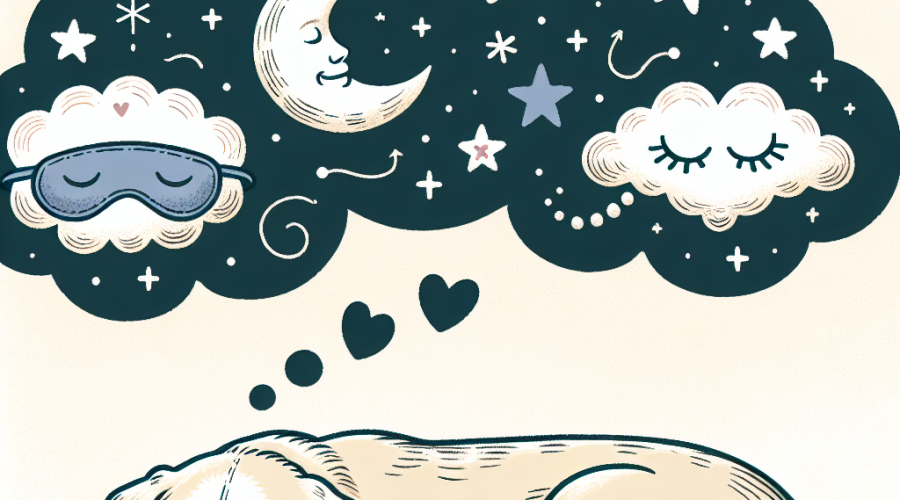Unveiling Canine Sleep Secrets for Restful Nights
Understanding your dog’s sleep habits can often feel like trying to solve an enigma wrapped in a furry, snoring riddle. Dogs, much like their human companions, need a good night’s rest to stay healthy and happy. But what exactly goes on when your pup is paddling their legs in the air, chasing dream rabbits? Unveiling the mysteries of canine slumber not only satisfies a pet owner’s curiosity but also ensures that we can provide the best care for our four-legged friends.
Dogs experience sleep in cycles, similar to humans, alternating between rapid eye movement (REM) and non-REM sleep. However, their sleep patterns differ significantly. While humans may require a solid seven to nine hours of sleep to feel well-rested, dogs can make do with shorter bursts of sleep throughout the day. This harks back to their wild ancestors, who needed to be alert to potential threats and opportunities around them.
Ever noticed your dog twitching or whimpering in their sleep? This is most likely during the REM stage, where your pooch is deep in dreamland. Dogs, like us, dream and process their daily experiences through these dreams. This stage of sleep is crucial for their cognitive functions, helping them consolidate memories and learn from their daily interactions.
It’s not just about the quantity of sleep, though. Quality matters immensely. A comfortable sleeping environment is essential for a dog’s good night’s sleep. Just as you wouldn’t want to toss and turn on a lumpy mattress, your dog appreciates a cozy, supportive bed to rest their furry head. The location of their bed is equally important, with most dogs preferring a quiet, safe corner where they can snooze without being disturbed.
But what about the old adage that a tired dog is a good dog? Exercise and mental stimulation undoubtedly play a role in your dog’s sleep quality. A sedentary dog may find it difficult to settle down at night, while an active dog, whose mind and body have been engaged, is more likely to drift off into a peaceful slumber. Integrating a mix of physical and mental activities throughout the day can help regulate your dog’s sleep cycle.
Diet also has a profound impact on your dog’s sleep. Meals loaded with high-quality nutrients support a healthy sleep pattern, whereas a poor diet can lead to restlessness and digestive issues, which may keep your dog awake at night. It’s essential to monitor what your dog eats, keeping an eye out for any adverse reactions to new foods or treats.
As pet owners, we’re often charmed by the sight of our dogs dozing off, but sometimes their sleep can be disrupted by health issues. Conditions such as arthritis can cause discomfort, making it hard for your dog to find a restful position. Regular vet check-ups can catch these problems early on, allowing for a management plan that can help your dog sleep comfortably through the night.
Age is another factor influencing your dog’s sleep. Puppies, much like human babies, need a significant amount of sleep to support their rapid growth and development. On the other end of the spectrum, senior dogs might sleep more due to lower energy levels or may experience sleep disturbances due to age-related health concerns.
And what about those middle-of-the-night bathroom breaks? Young puppies and older dogs may need to relieve themselves more frequently, which can interrupt their sleep (and yours). Establishing a routine and making sure your dog has ample opportunity to go outside before bedtime can mitigate these nocturnal disruptions.
A dog’s sleep is a barometer of their overall well-being, and as responsible pet owners, it’s our job to ensure they get the rest they need. By understanding the various factors that can affect canine sleep, from the comfort of their bed to their daily activities, we can take proactive steps to enhance their slumber.
To sum up, the keys to unlocking restful nights for your canine companion lie in providing a comfortable sleeping environment, adequate exercise, a balanced diet, and regular health check-ups. By paying attention to these aspects of your dog’s life, you’re not just ensuring they have sweet dreams—you’re also setting the stage for a healthy, happy pet.
As we delve into the depths of canine sleep secrets, it becomes clear that our furry friends are not so different from us when it comes to their need for quality rest. A little observation, care, and adjustment to their routines can go a long way in ensuring your dog, and consequently you, enjoy many restful nights to come. Sweet dreams to your faithful friend, may their snores be soft and their dreams be merry.
FAQs
Q: How many hours of sleep does an average dog need per day?
A: Adult dogs typically require about 12-14 hours of sleep per day, while puppies and older dogs may need upwards of 18 hours.
Q: Can dogs experience sleep disorders similar to humans?
A: Yes, dogs can suffer from sleep disorders, including insomnia, sleep apnea, and narcolepsy, which can affect their sleep quality and overall health.
Q: What are the signs that my dog isn’t getting enough sleep?
A: Signs of sleep deprivation in dogs include irritability, lethargy, and a noticeable decrease in attention and cognitive functions.
Q: How can I create an ideal sleep environment for my dog?
A: Providing a quiet, comfortable bed away from disturbances and maintaining a consistent routine can help create the perfect sleep environment for your dog.
Q: Do dogs have a specific sleep cycle, and does it affect their restfulness?
A: Dogs have a unique sleep cycle that includes stages of wakefulness, rapid-eye-movement (REM) sleep, and non-REM sleep, which affects how restful their sleep is and their need for multiple naps throughout the day.

